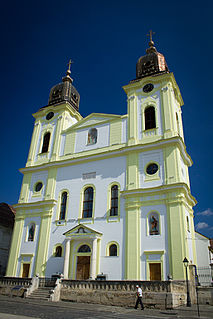
The Romanian Greek Catholic Church or Romanian Church United with Rome, Greek-Catholic, sometimes called, in reference to its Byzantine Rite, the Romanian Byzantine Catholic Church is a sui iuris Eastern Catholic Church, in full union with the Catholic Church. It has the rank of a Major Archiepiscopal Church and it uses the Byzantine liturgical rite in the Romanian language. It is part of the Major Archiepiscopal Churches of the Catholic Church that are not distinguished with a patriarchal title.

The Archeparchy of Făgăraș and Alba Iulia, in Romanian Arhieparhia de Făgăraș și Alba Iulia, is the only archeparchy of the Romanian Church United with Rome. Its Metropolitan, who holds the rank of Major Archbishop, is the head of the Greek Catholic Church in Romania. The title of "Major Archbishop" is one of only four such posts in the world. The suffragan dioceses in Romania are:. Only the diocese in America, the Romanian Greek Catholic Eparchy of St George, is exempt. The Eparchy of St. George takes part in the Church's synod.

The Hungarian Greek Catholic Church or Hungarian Byzantine Catholic Church is a metropolitan sui iuris ("autonomous") Eastern Catholic particular church in full communion with the Catholic Church. It is headquartered in Debrecen. Its liturgical usage is that of the Byzantine Rite in the Hungarian language.

The Romanian Greek Catholic Eparchy of Cluj-Gherla is an eparchy of the Byzantine Rite of the Romanian Greek Catholic Church. It is a suffragan of the Romanian Greek Catholic Major Archeparchy of Făgăraș and Alba Iulia.

The Roman Catholic Church of Romania is a Latin Rite Christian church, part of the worldwide Catholic Church, under the spiritual leadership of the Pope and Curia in Rome. Its administration for the Latin Church is centered in Bucharest, and comprises two archdioceses and four other dioceses. It is the second largest Romanian denomination after the Romanian Orthodox Church, and one of the 16 state-recognized religions. Overall data for 2011 indicated that there were 870,774 Romanian citizens adhering to the Roman Catholic Church. Of these, the largest groups were Hungarians, Romanians, Germans and Slovaks.

The Hungarian (Greek) Catholic Archeparchy of Hajdúdorog is a Metropolitan archeparchy of the Hungarian Greek Catholic Church.

The Greek Catholic diocese of Oradea Mare is the Eparchy of the Romanian Greek Catholic Church for the area of Oradea.

The Greek Catholic Eparchy of Maramureș was founded as a consequence of the Concordate between the Holy See and The Romanian State concluded on May 10, 1927 and ratified on June 10, 1929.
A particular church is an ecclesiastical community of faithful headed by a bishop, as defined by Catholic canon law and ecclesiology. A liturgical rite depends on the particular church the bishop belongs to. Thus "particular church" refers to an institution, and "liturgical rite" to its ritual practices.

The Romanian (Greek) Catholic Eparchy of Bucharest is an eparchy of the Romanian Greek Catholic Church. It is a suffragan of Romanian Greek Catholic Archdiocese of Făgăraș and Alba Iulia, which is the Major-Archbishopric of the Romanian Catholic particular church sui iuris.
This page is based on this
Wikipedia article Text is available under the
CC BY-SA 4.0 license; additional terms may apply.
Images, videos and audio are available under their respective licenses.







